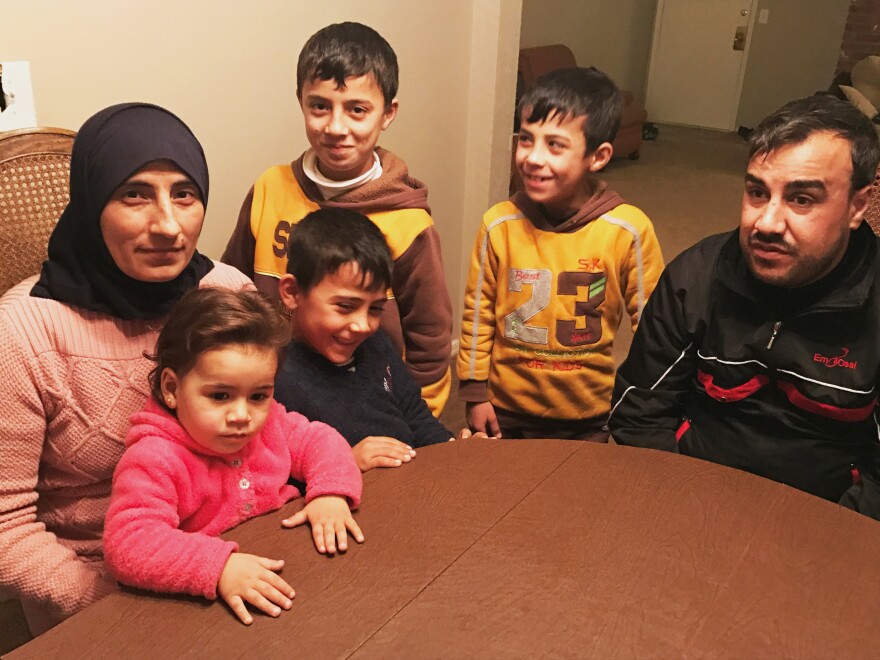Buried within the president’s executive order that, among other things, suspends the U.S. refugee program, there’s a provision that’s garnered little attention.
Down pretty far in Section 5 are a few lines that basically direct the Secretary of Homeland Security to see if state and local jurisdiction should be more involved in resettling refugees.
...the Secretary of Homeland Security shall examine existing law to determine the extent to which, consistent with applicable law, State and local jurisdictions may have greater involvement in the process of determining the placement or resettlement of refugees in their jurisdictions, and shall devise a proposal to lawfully promote such involvement.
The language is vague and is causing confusion, even desperation, among refugees who are already here and the agency officials who work with them.
Aisha Al Kurdey gathers her family around the dining room table in a comfortable Gladstone apartment.
Della Lamb Community Services, one of the three agencies involved in local refugee resettlement, placed her there two months ago.
With her two-year-old daughter on her lap, her sons (ages five, six and nine) gather around the kitchen table. Her husband, who is blind, sits opposite her. They talk about how the family is feeling about life in Kansas City.
"Thank God, we're OK, " Kurdey says through a family friend, who translates. "We're fine now. We’re safe."
This wasn’t always so. The family fled Homs in Western Syria during the military siege and spent four years in a crowded Turkish refugee camp.
"Over there (we) were in a tent. The bathroom and kitchen were far away," she says. "It was a very miserable life. Here everything is close by. My kids are starting school. I went to see it today and was very impressed!"
Her family and that of her husband are back in Syria. Many are in the same camp from which they were released. She says she prays they will be safe and will be allowed to join them in Kansas City.
"I pray day and night and ask God to open the gateway to get them out of agony and hardship they live in there," Al Kurdey says.
She says she doesn’t understand why the president and American people are so fearful of all refugees. She says the vetting process is rigorous. She and her family underwent dozens of interviews, were investigated, fingerprinted and checked out for two years.
Here’s how the process works:
A number of government agencies (the Department of Homeland Security, the State Department, Health and Human Services) do a long series of security and medical screenings, often lasting over a decade. Customs and Border Protection also vets refugees before they enter the country. Only then are they assigned to states, faith-based or non-profit agencies.
Judy Akers is executive vice president of Della Lamb. She says agencies were caught off guard by last week’s order.
"We all knew when (President) Trump got elected there would be changes and they would be dramatic," she says. "But honestly, I just assumed the changes would come in a planned process."
It’s not hard to see that Akers is nervous about the uncertainty the ruling creates.
"We don’t quite know (what will happen) but if this comes through it’s 'A, B, C' and if that comes through its 'D, E, F', a lot of conjecture. And we're still trying to fund the direct services as families come to the doors."
Della Lamb and other resettlement agencies get a lump sum on money from the federal government per refugee to provide housing and other necessities. They also receive funds to cover administrative costs. The abrupt suspension in the flow of refugees for 120 days is likely to cause an interruption in services. And the agencies contract with states, so if it turns out if states stop taking refugees, that’s a loss as well.
Hillary Cohen Singer, executive director of Jewish Vocational Services, says they placed nearly 600 refugees from 14 different countries last year.
"I think you have to look at the broader context of the track record of the refugee resettlement program," she says. "It is a multi-year process and this order takes that a giant step backward."
Advocates worry giving states greater power will politicize the program and create a mishmash of policies across the country.
Since the Paris terrorist attack in 2015, 31 governors (mostly Republicans) barred Syrians from settling in their states.
At this early stage, state officials are keeping pretty quiet.
Kansas Governor Sam Brownback was one the governors who pulled out of the refugee resettlement program entirely last spring. Brownback’s communications director, Melika Willoughby, said in an email that the president’s order mirrors the governor’s own concerns.
In Missouri, Rebecca Woelfel with the Department of Social Services, the agency that handles the refugee program, emailed this statement; “We have no additional information to share with you regarding the President’s Executive Order.”
But if Missouri Representative Mike Moon has any say, the governor will follow the lead of his counterpart in Kansas.
The pro-refugee camp likes to cite the wording on the Statue of Liberty: "Give me your tired, your poor, your huddled masses yearning to breathe free."
"It didn’t say give us your convicts and terrorists," Moon says. "If people are coming from regions (where) we cannot determine they’re peace loving, we have to act with caution."
Rep. Moon has expressed his feeling to the governor in a letter. He says he has yet to get a response.
Laura Ziegler is a community engagement reporter and producer. Follow her on Twitter @laurazig or contact her via email at zieglerl@umkc.edu.





